Type 2 diabetes is more than just a chronic condition—it’s a call to innovation, research, and renewed hope. In today’s post, we’re diving into the dynamic world of clinical trials and groundbreaking discoveries that are reshaping the way we understand, manage, and even combat this prevalent disease. Whether you’re a patient, caregiver, or simply passionate about the latest advancements, join us as we explore the innovations driving progress in type 2 diabetes care.

The Pulse of Clinical Trials
Clinical trials are the engine behind modern medicine, and today they are particularly important in the fight against type 2 diabetes. Leading studies focused on type 2 diabetes clinical trials are investigating new medications, lifestyle interventions, and even surgical approaches that offer the promise of more personalized care. These trials strive to provide better management and, in some cases, even pave the way to potentially reverse the condition. By participating in these studies, individuals not only gain access to innovative treatments but also contribute to a broader movement towards more effective care.
Cutting-Edge Discoveries in Research
The research community is buzzing with the latest studies on type 2 diabetes. Every new piece of research sheds light on the complex mechanisms behind the disease—from genetic factors to environmental triggers—and identifies potential new targets for treatment. These innovative findings are essential to developing therapies that do more than just manage symptoms; they aim to tackle the root causes of the disease. Whether you’re following academic research or the latest clinical updates, these breakthroughs underscore a future where a deeper understanding of type 2 diabetes could revolutionize patient care.
The Quest for Reversal
For a long time, type 2 diabetes was considered a progressively chronic condition. However, recent studies are challenging this view by exploring strategies for reversing type 2 diabetes. With a combination of dietary changes, intensive exercise regimes, and new treatment protocols emerging from clinical trials, there’s growing evidence that the progression of type 2 diabetes can be halted—or even reversed—in some patients. This innovative approach is reshaping our outlook on the disease, suggesting that remission may be within reach for many individuals.

Empowerment Through Education
Knowledge is the foundation of change. Diabetes education programs are vital to empowering patients to take control of their health. These programs offer comprehensive guidance on nutrition, physical activity, medication management, and coping strategies. By combining the latest scientific insights with practical advice, these initiatives help individuals make informed decisions and adopt healthier lifestyles. As more patients become educated about their condition, the collective impact on disease management and prevention continues to grow.
Looking Ahead: Innovation and Impact
The convergence of robust clinical trials and innovative research is creating a bright future for type 2 diabetes care. Advancements in understanding and treating the disease—from revolutionary clinical studies to comprehensive education programs—illustrate a proactive shift in healthcare. Every breakthrough, every clinical trial, and every educational initiative is a step toward a future where controlling type 2 diabetes becomes not just a hope, but a tangible reality.
Read More
- Mind and Body: How Type 2 Diabetes Affects Mental Health

- Meal Planning 101: Crafting a Diabetic-Friendly Diet

- Heart Health and Type 2 Diabetes: Reducing Cardiovascular Risks

Sources
- American Diabetes Association – Insights on clinical trials and diabetes research.
- Mayo Clinic – Comprehensive information on type 2 diabetes management.
- PubMed – A hub for the latest research studies on type 2 diabetes.
- Centers for Disease Control and Prevention – Resources on diabetes education programs and prevention initiatives.


